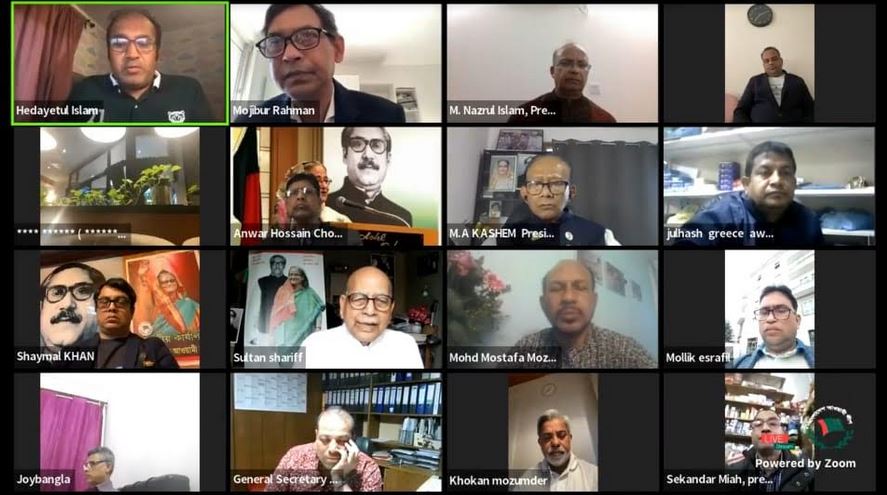
DHAKA, May 11, 2022 (BSS) - In the first international call for justice against the assassins of Bangabandhu and four national leaders, Bangabandhu's daughter Sheikh Rehana raised the demand at an international conference in 1979 in Sweden's Stockholm, a historic beginning that culminated in success, long after, during the Sheikh Hasina-led Awami League government, said speakers.
On May 10, 1979, she turned the global attention to the darkest chapter in the country's history through a speech at an all-European Bakshal conference, participated by European country heads, the UN chief, and international NGO high-ups in Stockholm, said a press release.
That incident goes down in the annals of history as the voice for global pressure on the then-Bangladeshi government was raised through that emotion-choked rendition, they added.
Speakers reflected on the event at a virtual meeting, organized by the ruling Awami League's research wing Centre for Research & Information (CRI), on Tuesday night.
Awami League Advisory Council Member Amir Hossain Amu, MP, its International Affairs Secretary Dr. Shammi Ahmed, Information and Broadcasting Minister Dr. Hasan Mahmud, and UK Awami League President Sultan Sharif Mahmud, among others, spoke at the program.
The meeting was conducted by all European Awami League President M Nazrul Islam, who reminisced about the initiatives undertaken in the UK, Sweden, and other parts of Europe, demanding justice for Bangabandhu's assassination.
Sultan Sharif said, "Without Sheikh Hasina's inspiration, it wouldn't be possible to organize the conference. At the same time, if Sheikh Rehana didn't take the initiative with us, we wouldn't see this bright day today."
"If the two daughters of Bangabandhu were not abroad at that time, how long would we be subjected to repression? How long would we be victims of the conspiracy of assassins?" said Amir Hossain Amu.
"They reinvigorated the party through different activities in London, raising voices for the justice for Bangabandhu's assassination. They formed a probe committee under Sean MacBride and tried to help them come to the country and investigate the incident. But, their visa application was turned down by the then-Ziaur Rahman government," he added.
"Through Bangabandhu's murder, the spirit of the Liberation War and achievements were destroyed. Under the leadership of Sheikh Hasina, we became able to restore all those achievements. Bangabandhu's killers were brought to book. We got back to the original four pillars of our constitution and war criminals were tried. The nation was saved from the zombies of Pakistan and their agents."
Appreciating Sheikh Rehana for her ability to handle situations in a calm manner, Dr. Hasan Mahmud said that she guided them at critical moments like the arrest of Sheikh Hasina. She sent acclaimed lawyer Cherie Blair to the country.
As recorded in history, Sheikh Rehana planned to meet acclaimed legal practitioner Sir Thomas Williams, QC, who had defended Bangabandhu in the Agartala Conspiracy Case. Bouncing the idea off Sheikh Hasina, she, along with Dr. Shafique, met him at the House of Commons, requesting him to accept the post of president of all-Europe Bangabandhu Parishad, to which he obliged.
On August 16, 1980, commemorating the fifth year of Bangabandhu's assassination, a huge gathering, the largest till then following the independence of Bangladesh, was organized, with Sheikh Hasina gracing the event as the chief guest and Sir Thomas Williams, QC as the main speaker.
Doctor Conrad Wood of the British Conservative Party and two lawmakers from the British Labor Party spoke at the program, where Sir Thomas Williams promised to bring the assassins to the book, said sources at Awami League.
On September 19, 1980, the veteran legal expert formally announced, at a restaurant near the House of Commons in London, the formation of a probe committee on Bangabandhu's assassination, with him being the head and Nobel Peace Prize winner and Irish lawyer Sean MacBride being one of the members.
As Jeffrey Thomas MP and Solicitor Abre Rose applied to Bangladeshi High Commission for visas in the January of 1981, their application was turned down, and the visa rejection issue made its way to the House of Lords in February. The then-British Prime Minister Lord Carrington and many others took part in the discussion. The international probe committee submitted a preliminary report on the murder of Bangabandhu and his family and four national leaders, on March 20, 1982.